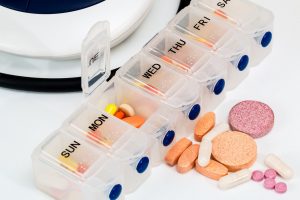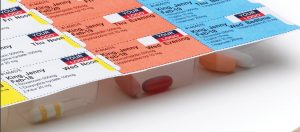Medication Adherence – How it Affects Your Health
Betty Chaffee/ June 24, 2020/ Medication Management, Medication Therapy Management, Self management, Taking medicine as prescribed/ 2 comments
Have you ever heard of the term "adherence" when it comes to taking medications? Medication adherence means taking medications correctly, the way they were prescribed. Research shows that nearly half of us don't take our medications as they were prescribed. Sometimes it's on purpose, sometimes not. But either way, a medication can't improve health if it's not taken as prescribed. How does medication adherence affect you?
Why is adherence to medications so hard?
Everybody, and I mean everybody, forgets to take their medications sometimes. Doesn't matter how old or young you are. You get in a habit, then one day you find yourself wondering if you actually took your medicine. Memory just isn't perfect.
But there's more to medication adherence than memory. We may misunderstand instructions given by the prescriber, espeically when an office visit is rushed or instructions are complex. The prescription may be very expensive, so we either don't purchase it at all or don't take it regularly. We may not be taught how to use a new device, like an inhaler, and then use it incorrectly. Or we may be concerned about side effects, doubt that a new medication will be helpful, or just not want to take prescription medications.
There are many reasons medications aren't taken as they were prescribed. No wonder so many of us have trouble with medication adherence!
What does non-adherence to medications do to our health?
When we don't take our medications as prescribed, we don't get the health benefits they offer. Not only that, but our doctor may assume we're taking our medicine correctly, then write another prescription because it doesn't seem to be working. Now we're on even more medication, with the resulting increase in costs and risk of side effects.
Research clearly shows that adherence to certain types of medications can predict health outcomes. Medications for blood pressure, asthma, COPD, depression, high cholesterol, and blood clots are some of the most important. When your chronic health problems are under control you stay healthier. And you're less likely to be hospitalized or require urgent medical treatment, so healthcare costs are lower. Taking medications as prescribed at least 80% of the time is linked to better health and decreased costs, both for you and for the health system overall.
Who's watching out for adherence problems?
Prescription insurers are watching closely for adherence to medications for the health problems listed above, along with others. When your prescriptions aren't refilled often enough, the insurer may ask your pharmacist to talk with you. Medicare part D prescription insurers frequently request check-ins with patients, and some commercial insurers do, too. Maybe you've already been on the receiving end of one of these calls and wondered if "big brother" was watching you. But it's all about your health - making sure you get the best value from the medications you take.
How can your pharmacist help you when medication adherence is a problem?
Your community pharmacist and pharmacy technicians want to help you stay healthy. Asking you about how you take your medications, and how often you typically miss doses is one way of getting there. Remember, many people (including health professionals!) find it hard to adhere to chronic medications. There's no shame in that, it's a fact of life. But to get the best health outcomes, it's crucial to talk with your pharmacist. Together you can find what's keeping you from taking your medications as prescribed, then work on a solution.
If you're among the many who simply forget to take your medications regularly, don't despair. There are quite a few options that can make things easier.
 The medication organizer is one of the simplest, and can be purchased in a number of different sizes. Whether you take medications once daily, twice daily or more, there's an organizer that can make it easier for you to take the right medications at the right time every day. Some even have small removable containers so that you can take some of your meds with you if you're going to be out. Your pharmacy likely has a variety of organizers to choose from.
The medication organizer is one of the simplest, and can be purchased in a number of different sizes. Whether you take medications once daily, twice daily or more, there's an organizer that can make it easier for you to take the right medications at the right time every day. Some even have small removable containers so that you can take some of your meds with you if you're going to be out. Your pharmacy likely has a variety of organizers to choose from.
 Another option is "convenience packaging", offered by many pharmacies, which also organizes meds by time of day. A great advantage of convenience packaging is that your pharmacy does the organizing and filling for you, a month at a time! The image at the right is an example of convenience packaging from Jensen's Community Pharmacy.
Another option is "convenience packaging", offered by many pharmacies, which also organizes meds by time of day. A great advantage of convenience packaging is that your pharmacy does the organizing and filling for you, a month at a time! The image at the right is an example of convenience packaging from Jensen's Community Pharmacy.
 And for those who enjoy solving problems with technology, there's a variety of SmartPhone apps that can provide medication reminders whenever they're needed.
And for those who enjoy solving problems with technology, there's a variety of SmartPhone apps that can provide medication reminders whenever they're needed.
But maybe simple forgetfulness isn't the problem. You might be worried about the high cost of your medication. If so, your pharmacist can help you and your doctor look for lower cost alternatives or patient-assistance programs from drug manufacturers.
Your pharmacist can also help if concern about potential or actual side effects is keeping you from taking your medication regularly. Talk with your pharmacist about possible side effects, how to watch for them, and what to do if they happen. Often, side effects can be managed while the medication is continued, but other times it makes more sense to find an alternative medication.
What if you just don't want to take yet another medication? Well, your pharmacist can help here, too! Talk about the risks and benefits of using the medication, and the risks and benefits of NOT using the medication. Are there lifestyle changes that might improve your health without needing to take a medication? Working together with your pharmacist and your prescriber can find a treatment plan you can get behind!
Devices like inhalers and injectables can be complicated to use correctly. If one of your medications comes in a device you might be taking it incorrectly and not even know it. Technique is important with devices and good training is needed. But along with training, be sure to have someone check your technique every so often as a refreshser. Ask your pharmacist to work with you to make sure you're getting the most out of your medication device.
There are many reasons for non-adherence, and there are just as many ways to resolve the problems. But talking about it with your medication expert, your pharmacist, is the best way to start. Your doctor can also be kept in the loop so that any changes in your health will be better understood. With good communication, you, your doctor, and your pharmacist can work toward the same goal: to get you the best health outcomes from your medications and decrease your overall healthcare costs.
As always, we welcome your questions and comments below. Or you can contact us directly at BetterMyMeds!



Excellent information. I did not realize that pharmacists offer convenience packaging. I have to imagine that there would there be an additional cost to the patient to get that option since it would take more time to prepare. Is that something that is only offered for certain prescriptions and does a patient have to ask for it in advance? I also have to imagine that there will be people that request the convenience packaging AFTER they having the script filled in the traditional bottle. Another question is for the pharmacist to call on a patient if a refillable prescription is not renewed. How would the pharmacist know if a patient switched to a different pharmacy?
Hey Tony!
Some pharmacies offer special packaging and others don’t. And some add an extra fee for the reasons you pointed out, while others waive the fee if the patient fills several prescriptions routinely at that pharmacy. I’d suggest contacting your pharmacy to ask about the services they offer.
Pharmacies do a pretty good job of making it clear that specialized packaging must be requested at the time a medication is refilled, and all meds must be on the same refill schedule (another issue your pharmacist can help with!). If you opt for convenience packaging, typically your pharmacy will call you ahead of the refill date to make sure all meds need to be refilled. That’s when the pharmacist might ask questions if it turns out one or more medications got off schedule, and a good time to have the conversations described in the article.